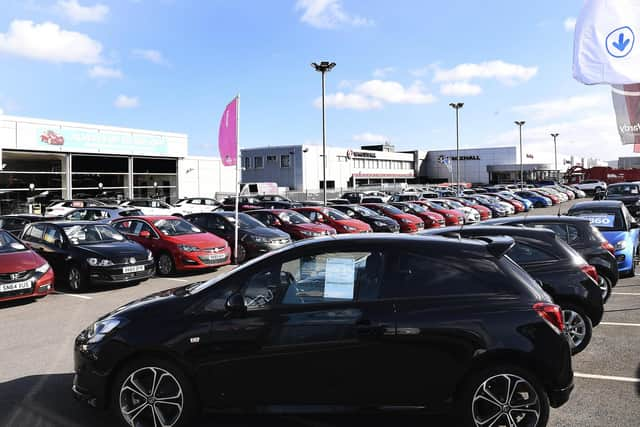Car sales down a quarter on pre-Covid levels but demand for EVs charges up
This article contains affiliate links. We may earn a small commission on items purchased through this article, but that does not affect our editorial judgement.
Industry body the Society of Motor Manufacturers and Traders (SMMT) said 58,994 new cars were registered in February. That is up 15 per cent on the same month last year when showrooms were closed due to coronavirus lockdowns.
But the total was 25.9 per cent below February 2020, before the virus crisis impacted new car sales.
Advertisement
Hide AdAdvertisement
Hide AdRegistrations continue to be restricted by the global shortage of computer chips.


The number of pure electric new cars registered last month nearly trebled year-on-year, taking a market share of 17.7 per cent.
The SMMT urged the UK government to reform VAT rules for electric vehicle (EV) charging as energy costs continue to soar.
Chief executive Mike Hawes added: “Despite February’s traditional low registration numbers, consumers are switching to EVs in ever-increasing numbers.”
Karen Johnson, head of retail and wholesale at Barclays Corporate Banking, said: “Across the country, business fleets are starting to look a little worse for wear. Many haven’t been changed since the start of the pandemic two years ago, and are overdue a refresh.
“This could mean big things for electric, with businesses looking to update their fleets and address their green credentials at the same time.”
Founder and chief executive of Electrifying.com, Ginny Buckley, noted: “These stats prove the electric revolution is happening right now and that consumers are leading the switch - we know that 53 per cent of our audience are looking to buy an electric car in the next year which is why we need operators, local councils and government to keep up with the pace of the transition.”
Chris Evans, head of sales at Heycar, added: “We’ve had around 12 months of no new car supply, it’s been a year like no other. While we thought things would be returning to some kind of normality by summer, with the developing situation in Ukraine, that is not likely.
Advertisement
Hide AdAdvertisement
Hide Ad“Even though we’ve seen glimmers of hope, especially on our way out of various lockdowns, supply has been hammered once again by the semiconductor shortage.”
A message from the Editor:
Thank you for reading this article. We’re more reliant on your support than ever as the shift in consumer habits brought about by coronavirus impacts our advertisers. If you haven’t already, please consider supporting our trusted, fact-checked journalism by taking out a digital subscription: www.scotsman.com/subscriptions
Comments
Want to join the conversation? Please or to comment on this article.
